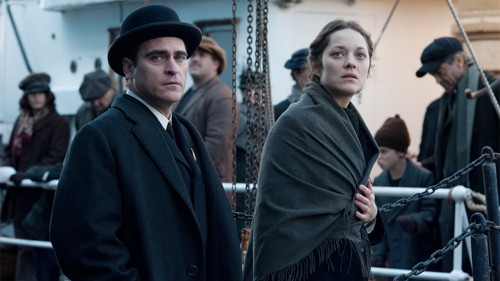The Immigrant: Reuben Casserole Recipe 🥁🥁🥁🥁🥁
/Exquisite, Classic, Soulful
Year Released: 2014
Directed by: James Gray
Starring: Marion Cotillard, Joaquin Phoenix, Jeremy Renner
(R, 120 min.)
Genre: Drama, Romance

"Seems," madam? Nay, it is; I know not "seems." Hamlet (William Shakespeare)
This may very well be the very best film I have seen in my entire life, but I hesitate to say so since that may set it up too high and perhaps predispose it for a fall. But suddenly every other film of the last few decades seems hollow, contrived, and trivial. It’s like kissing a prince and suddenly realizing one has been lip-locking frogs up until that moment.
I have even downgraded Chef, a perfectly delightful comedy from a perfect 5 to a 4 ½ after seeing this exquisite piece. They are not even in the same neighborhood, and that is also true for such other highly rated Different Drummer favorites such as The King’s Speech, August: Osage County, and The Artist, or even my husband’s beloved Babette's Feast.
The Immigrant is so moving that my husband and I were stunned to silence as we left the theater – something similar to our mutual mute awe when we first saw Alan Arkin in The Heart is a Lonely Hunter back in Bloomington, Indiana, during our college days.
This is the kind of film that should bring my dear friend Carolyn back to the cinema, she who has more or less abandoned the movie house since 1964. Here are a few comparisons of The Immigrant to other highly touted pretenders:
Real fresh pineapple vs. the canned sweet stuff
Tchaikovsky’s violin Concerto in D major vs. elevator Muzak
A home-grown tomato vs. the greenhouse variety sold in supermarkets
Simply, this Indie film is the story of Polish immigrant Ewa Cybulska (Marion Cotillard) and the desperate choices she is forced to make when she and her sister are separated as they arrive at Ellis Island in 1921. Magda (Angela Sarafyan) has a lung condition and is forced into quarantine at the island’s infirmary, while Ewa finds herself alone and friendless.
The American aunt and uncle who are her sponsors do not show up; their address is “false,” and Ewa is accused of having “low morals” as documented by events that purportedly occurred aboard ship. She is about to be deported when Bruno (Joaquin Phoenix) has a few short words with an official – a discreet exchange of cash is hinted at – and then introduces himself as a representative of Traveler’s Aid.
He promises Ewa a room and a respectable job working as a seamstress at the vaudeville theater group he runs, but her irrevocable descent into prostitution is the ugly reality that follows. Poor Ewa resists this degradation as long as possible, but she needs funds to support Magda in quarantine. Bruno also keeps her in in thrall by nourishing the hope that the two sisters can be reunited when Ewa earns enough cash, thus condemning her to what the devout Catholic realizes is a spiritual path to eternal damnation.
Several factors separate this film from others about the oldest profession. The two most compelling are the quality of its telling, and the depth and complexity of the characters. It is reminiscent of the tragedy of Tess of the d’Urbervilles, Thomas Hardy’s tale of a pure woman who also meets her downfall at the hands of an unscrupulous man. And the tragedy is just as iconic and classic.
Also like Sofya, the young woman forced into prostitution in Dostoevsky’s Crime and Punishment, Ewa is also spiritually chaste even as she sells her body:
She becomes more conventionally beautiful as she is exploited, but we are left to see—in her eyes, maybe the best eyes in modern film—that her honor has remained intact. –David Thompson
And that purity has a subtle effect on Bruno, at first bringing out his inner demons. Even as he acts as her procurer (I refuse to say “pimp,” a word my mother always thought vulgar in itself as well as in what it portrayed), he is hopelessly in love with her and insanely jealous of the attentions his cousin Orlando, an illusionist whom Ewa encounters at Ellis Island when she attends his performance there in order to get a glimpse of her sister in the audience.
Two other aspects make this film a classic, and perhaps they also account for its muted reception as well. First of all, there are no attempts to gloss over the degradations of prostitution as there were, for instance, in Julia Robert’s Pretty Woman, where she is portrayed as a sort of satisfied sex worker/entrepreneur. Ewa’s self-loathing, exploitation, and disgrace are all told in her soulful eyes. Nor is there any indication that women revel is being sex objects as we see portrayed ad nauseam in television, film, and the music industry.
Another point that probably offends secular America is the sense of sin and redemption, as well as a respect for the clergy. Ewa and her sister regularly pray to the Virgin Mary; their Catholic faith is preeminent to them. We would probably have to go back at least half a century for that to be seen in film. Actually, when Ewa enters the confessional, I half expected her to recognize the priest as one of her customers, so jaundiced had even I become since the ruthless war waged against Christianity in general and the Catholic Church in particular in recent decades.
Actually, that confessional scene is the pivotal moment in the film, one that reaches into more souls than just Ewa’s. It reverberates with the audience and sets up the final riveting scene where Joaquin Phoenix establishes himself as one of the finest actors in filmdom today.
Do not miss this exquisite film that shows life as it is rather than how the box office panderers pretend it to be.
–Kathy Borich

Trailer
Film-Loving Foodie
In our diet conscious/Dr. Oz world we forget how recently just getting enough to eat was a major problem for very many, even in the so-called roaring twenties. Not everyone was a Jay Gatsby or on the list to attend one of his lavish parties.
Such is true for Ewa and the throng of immigrants who entered our country in pursuit of the American Dream only to be turned out on the mean streets of New York. A simple room out of the cold and warm meal are enough to ensnare poor Ewa in the clutches of the man who poses as her savior.
Let us celebrate her resilience and courage as we eat this simple version of the famous Reuben Sandwich in a Casserole version. If you want to make it a bit more Polish, feel free to substitute Polish Kebasa sausage for the corned beef.
Reuben Casserole Recipe
Ingredients
Original recipe makes 6 servings
6 slices rye bread, cubed
1 (16 ounce) can sauerkraut, drained and rinsed
1 pound deli sliced corned beef, cut into strips
3/4 cup Russian-style salad dressing
2 cups shredded Swiss cheese
Directions
. Preheat oven to 400 degrees F (200 degrees C).
. Spread bread cubes in the bottom of a 9x13 inch baking dish. Spread sauerkraut evenly over the bread cubes, then layer beef strips over sauerkraut. Pour dressing over all.
. Spray aluminum foil with cooking spray and use to cover baking dish, sprayed side down. Bake in the preheated oven for 20 minutes.
Remove cover, sprinkle with cheese and bake uncovered for another 10 minutes, or until cheese is melted and bubbly.










